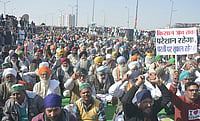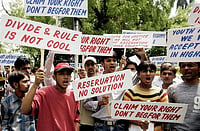The United Nations (UN) experts have said that the Iran's proposed new hijab law could amount to "gender apartheid".
In Iran, women are required by law to wear Islamic head coverings called hijab in public. Women found to be violating the law are punished.
The proposed new hijab law, which is currently with an Iranian parliamentary committee, brings new stiff punishments to celebrities and businesses that either violate the hijab law or hail the violation.
The comments by the UN experts and the proposed law itself come weeks before the first anniversary of the custodial death of Mahsa Amini, a 22-year-old ethnic Kurdish Iranian woman, which trigerred months of nationwide protests in Iran. The protests were largely led by women and witnessed women walking bare-headed and publicly tearing and burning their hijabs in defiance of the Iranian regime.
Here we explain the proposed new Iranian hijab law, what the UN experts said, and why Iran wants to contain celebrities on the hijab issue.
What's the proposed new Iranian hijab law?
After the Islamic Revolution of Iran in 1979, the country has been run on a strict interpretation of Islamic law called Sharia.
In the Revolution, the conservative Islamic clergy overthrew the liberal, pro-Western monarchy and established a conservative state under the Supreme Leader of Iran. Since then, women have been required to wear hijab in public by law. The 'morality police' implements the law in the public place.
Besides the wearing of hijab, women are also legally required to not wear form-fitting or revealing clothes. The imingling of the opposite genders in the public space is also regulated. One of the contentious provisions of the proposed new law also addresses segregation in addition to the issue of hijabs.
Under the proposed new Iranian hijab law, violators would be banned from employment opportunities and could be fineed up to $1,000, reported Iran International.
"If approved, adherence to hijab laws would become a criterion for employment in public or private organisations in the future. Clothing that reveals the neck, arms above the wrist, and legs above the ankles will be considered 'inappropriate clothing' and will be punishable by a cash fine of up to 500 million rials ($1,000) for the first infringement," reported Iran International.
Not covering the head will also be punishable by a cash fine of 240 to 500 million rials for the first instance and up to 1.5 billion rials if repeated more than four times, reported Iran International.
The women convicted under the proposed new hijab law could given a fine, a ban on leaving the country, and a ban on public activity on the internet for up to two years, reported RFE/RL. This is particularly damning for celebrities and influencers whose careers as well as reach could be harmed from travel and internet bans.
RFE/RL also reports that the proposed law prohibits "commissioning work or advertising from individuals or legal entities that promote non-hijab values in their activities inside or outside the country" in any form offline or online.
New Iranian hijab law could amount to gender aparheid: UN experts
The United Nations (UN) experts have said that the new proposed Iranian hijab law could amount to "gender apartheid".
The UN experts have also said that the new laws weaponise public morals, according to CNN, which says that the experts include many special rapporteurs and a working group focused on discrimination against women and girls.
"The draft law could be described as a form of gender apartheid, as authorities appear to be governing through systemic discrimination with the intention of suppressing women and girls into total submission," said the UN experts, as per CNN.
The experts also said that the proposed as well as current provisions are "are inherently discriminatory and may amount to gender persecution".
The experts noted that the new provisions have come in the wake of monthslong protests after Mahsa Amini's death and have urged the Iranian authorities to reconsider the implementation, reported CNN.
The UN experts further said, "The weaponisation of ‘public morals’ to deny women and girls their freedom of expression is deeply disempowering and will entrench and expand gender discrimination and marginalisation, with wider negative consequences for children and society as a whole."
The targeting of Iranian celebrities
As stated above, a particular feature of the proposed new laws is the targeting of Iranina celebrities.
During the monthslong protests, several Iranian celebrities, including actors, singers, and sportspersons, defied the hijab law and supported the protesters. The protests following the death of Mahsa Amini emerged as the biggest acts of defiance of the Iranian regime. The regime is now cracking down on dissent and those who supported dissent.
Even before the new laws have come into effect, such clampdown has started. In July, three prominent Iranian actresses were convicted for various violations related to the hijab laws and were handed various sentences including travel and internet bans. They were also declared mentally ill and were handed stays at government mental institutions. The three actresses are Azadeh Samadi, Leila Bolukat, and Afsaneh Bayegan.
The three actresses are among many who have taken part or supported the protests after Amini's death. Though the widespread nationwide protests have died down by now, individual acts of resistance have continued and the Iranian regime has redeployed the morality police and has introduced increased surveillance measures to crack down on dissent.
Of the three actresses, Samadi was denied access to her phone for six months, her social media accounts were ordered disabled, and sentenced to an official counselling centre for her 'anti-social personality disorder'; Bolukat was sentenced to four months in a remote prison, was banned from acting, was banned from using social media for two years for posting photos on social media without hijab, and was also handed a travel ban; and Bayegan was given a suspended two-year prison sentence and was ordered to make weekly visits to a psychological center, banned her from social media and leaving the country for two years.
Several sportspersons, such as chess player Sara Khadem and skater Niloufar Mardani, have competed without hijabs in protest and singers like Shervin Hajipour, who won a Grammy Award for a song that became the unofficial anthem for protesters, have spread the Iranian women's movement at the world stage.


























